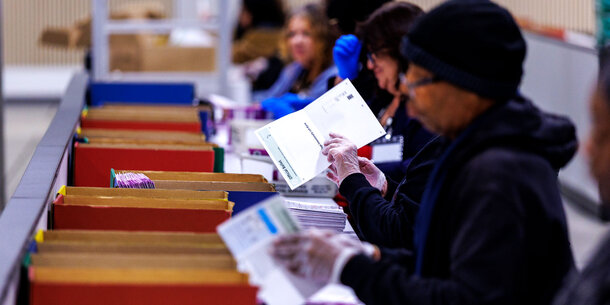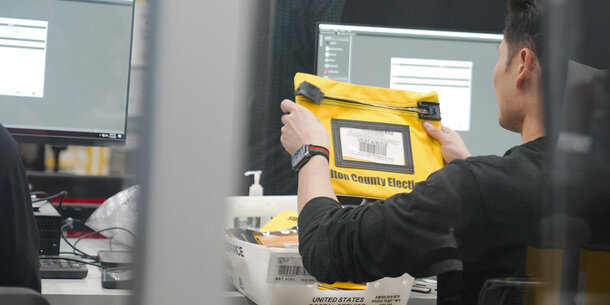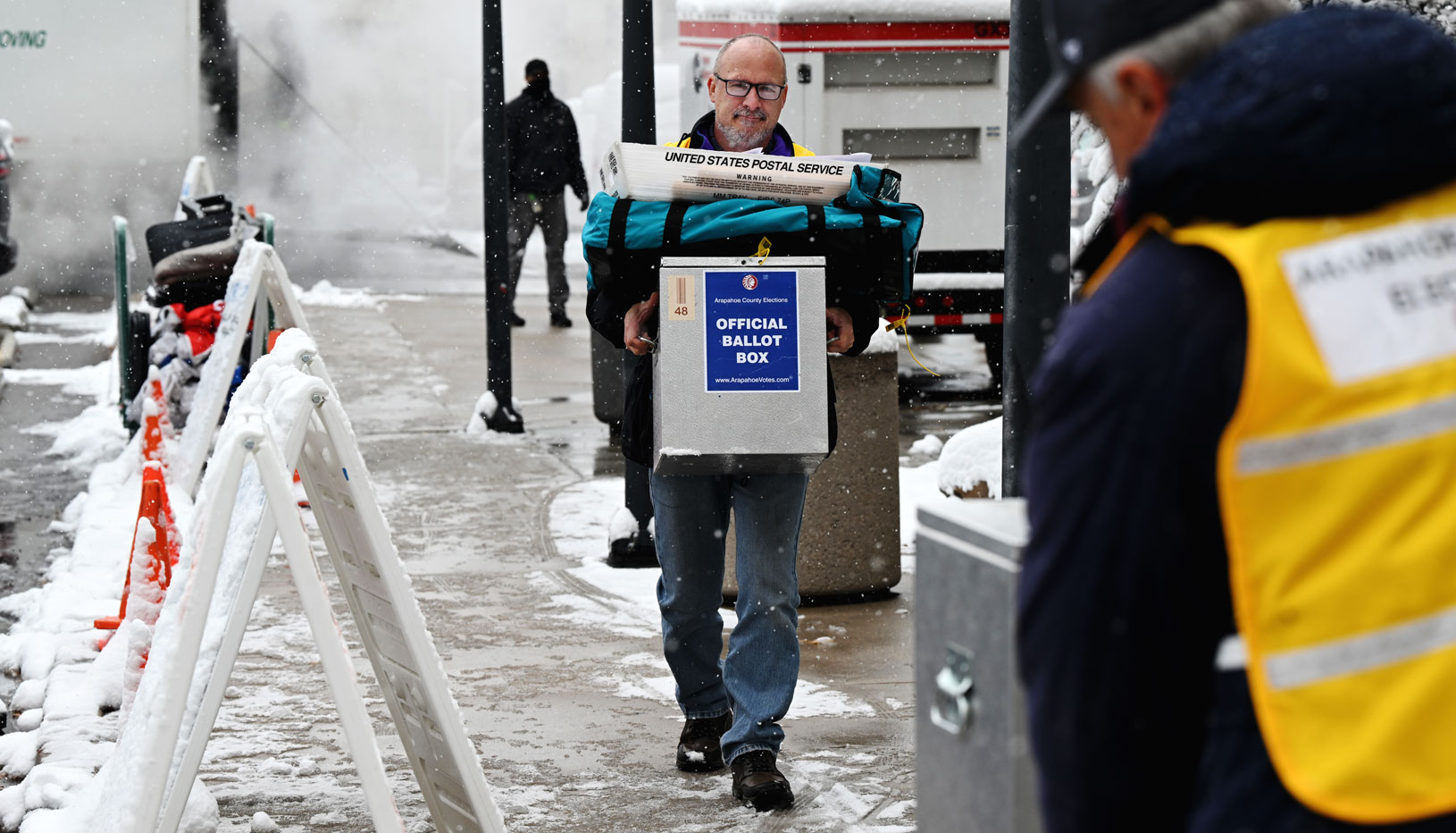The problem of election misinformation is vast. Part of the problem occurs when there is high demand for information about a topic, but the supply of accurate and reliable information is inadequate to meet that demand. The resulting information gap creates opportunities for misinformation to emerge and spread.1
One major election information gap developed in 2020, when the Covid-19 pandemic drove many states to expand access to voting by mail.2Inadequate public knowledge about the process left room for disinformation mongers to spread false claims that mail voting would lead to widespread fraud. Election officials — managing unprecedented challenges to ensure what federal authorities ultimately called “the most secure election in American history”3 — could not fill information gaps with accurate information in time. As is now well known, no less than former President Trump promoted these false claims, among others, to deny the 2020 presidential election results and provoke the January 6, 2021, attack on the U.S. Capitol.4
In 2022, false narratives about a stolen 2020 election persist, even as an unprecedented spate of restrictive voting law changes across the country has created fresh information gaps and, thus, fresh opportunities for misinformation. Since 2020, at least 18 states have shrunk voting access, often in ways that dramatically alter procedures voters might remember from the past.5Meanwhile, lies and vitriol about the 2020 election have affected perceptions of election administration in ways that complicate work to defend against misinformation.
This paper identifies some of the most significant information gaps around elections in 2022 and new developments in elections oversight that will make it harder to guard against misinformation. Ultimately, it recommends strategies that election officials, journalists, social media companies, civic groups, and individuals can and should use to prevent misinformation from filling gaps in public knowledge. Lessons from other subjects, such as Covid-19 vaccine ingredients and technologies,6show how timely responses and proactive “prebunking” with accurate information help to mitigate misinformation.7
The consequences of ignoring the misinformation risk posed by these information gaps could be severe. Already, voter trust in elections has plunged since 2020.8Threats to election officials have become a serious public safety problem, with 60 percent of election officials reporting in a recent Brennan Center survey concerns that threats, harassment, and intimidation will thin their ranks.9After major changes to voting procedures since 2020, at least one state — Texas — has already seen remarkable increases in mail ballot rejections, and several other states have newly disenfranchised some minority voters.10
Key findings
- Since the beginning of 2021, many states have enacted an unprecedented wave of laws that restrict voting access. At least 18 states, including congressional battlegrounds, passed 34 restrictive laws that could create significant information gaps for voters and result in misinformation.11Among them are laws that make it harder to vote by mail, shrink drop box numbers, impose draconian voter ID requirements, punish election workers for routine conduct, empower partisan poll watchers, and eliminate Election Day voter registration. Several states enacted expansive laws, which could also cause confusion and thus risk misinformation.12But restrictive changes carry the added risk that voters will mistakenly believe they address real problems of election integrity, confirming or creating false assumptions about widespread voter fraud, for instance, and feeding a disinformation feedback loop around the Big Lie.13And many new restrictions impose complex new requirements, which bad actors or confused citizens could misstate in ways that deter voters.14Some new laws may also increase voter confusion and misinformation by reducing election staff, delaying results, emboldening partisan poll watchers — thousands of whom conservative organizations have recruited in an unprecedented push to prepare to challenge election results15 — or creating other unusual conditions.
- New citizens and new voters — who are disproportionately Latino — face special risks in encountering misinformation stemming from information gaps. Information gaps can specially affect new voters and newly naturalized citizens because they lack familiarity with U.S. voting procedures. Newly registered voters are most likely to be Latino.16At the same time, election misinformation and disinformation targeting Spanish-speaking and Latino communities is particularly virulent.17These new voters may face greater difficulties in recognizing misinformation resulting from information gaps around recent voting law changes.
- Election denialism in 2022 makes it harder to defend against misinformation resulting from information gaps. Baseless denials of the 2020 election results often include attacks on the election process itself, making the task of providing voters accurate information more urgent but also more challenging. Threats and harassment have driven striking numbers of election officials from their posts since 2020. A recent Brennan Center poll found one in five local election officials say they are likely to resign before the 2024 presidential election.18These departures would drain administrative expertise from the field.19Meanwhile, election denialism has infected races for offices with power over elections, with dozens of candidates across at least 18 states embracing false claims of a stolen 2020 presidential election.20Their messages encourage people to make sinister assumptions about unfamiliar voting procedures.
- Texas and Los Angeles County, California, provide contrasting examples of how to address the significant information gaps facing voters. Texas voters received too little accurate information on major changes to mail voting ahead of the state’s 2022 primary election, after a new law constrained election officials’ ability to conduct public outreach. In the primary, mail ballot rejection rates in Texas skyrocketed compared to past years, up more than 1,100 percent from the 2020 presidential election.21By contrast, ahead of California’s procedurally unusual 2021 gubernatorial recall election, Los Angeles election officials proactively educated voters on topics of confusion and prepared to prevent and mitigate misinformation in real time.22The election unfolded with remarkably little controversy.
Key recommendations
Recommendations for election officials
- Plan well-timed voter education campaigns that include resources such as Frequently Asked Questions pages and video tutorials.
- Provide educational resources in voters’ preferred languages.
- Consider publishing rumor control pages to “prebunk” misinformation.
- Build and maintain a network of partners and messengers — including secretaries of state, community groups, candidates of all affiliations, business groups, and the media — to amplify accurate election information.
- Where languages other than English are common, election officials should seek partnerships with messengers who can reach such voters and have their trust.
Recommendations for community-based organizations
- Develop contacts among election officials and nonpartisan voting experts.
- Provide accurate election information and tools to identify misinformation to community constituencies in preferred languages and formats.
- Develop partnerships with trusted messengers to ensure community education efforts travel further.
Recommendations for journalists
- Cultivate authoritative sources on elections, including election officials.
- Report pre-election stories on confusing or new topics.
- Provide accurate context and perspective in covering commonplace glitches or delays, consulting with nonpartisan experts where needed to help prevent misinformation.
Recommendations for internet and social media companies
- Publish and amplify accurate, authoritative election information.
- Publish clear and transparent policies to minimize election misinformation.
- Create infrastructure to impede election misinformation, such as effective education tools and algorithmic interventions that slow the spread of misinformation.
- Defend election official websites and accounts against hacking and interference.
Recommendations for the public
- Make a plan to vote that accounts for recent changes in voting procedures.
- Learn how to recognize online misinformation and build news literacy.
- Seek out context for troubling election-related claims.
- Share accurate voting information with social, civic, and faith networks.
Endnotes
-
1
Tommy Shane and Pedro Noel, “Data Deficits: Why We Need to Monitor the Demand and Supply of Information in Real Time,” First Draft News, September 28, 2020, https://firstdraftnews.org/long-form-article/data-deficits/. -
2
Michael Waldman, “Voting by Mail Under Threat Again,” Brennan Center for Justice, February 23, 2021, https://www.brennancenter.org/our-work/analysis-opinion/voting-mail-under-threat-again; and Wendy Weiser et al., “Mail Voting: What Has Changed in 2020,” Brennan Center for Justice, September 17, 2020, https://www.brennancenter.org/our-work/research-reports/mail-voting-what-has-changed-2020. -
3
Jen Kirby, “Trump’s Own Officials Say 2020 Was America’s Most Secure Election in History,” Vox, November 13, 2020, https://www.vox.com/2020/11/13/21563825/2020-elections-most-secure-dhs-cisa-krebs. -
4
Lauren Miller and Wendy Weiser, “January 6 Hearings and the Big Lie’s Ongoing Damage to Democracy,” Brennan Center for Justice, June 13, 2022, https://www.brennancenter.org/our-work/analysis-opinion/january-6-hearings-and-big-lies-ongoing-damage-democracy. -
5
Brennan Center for Justice, “Voting Laws Roundup: May 2022,” May 26, 2022, https://www.brennancenter.org/our-work/research-reports/voting-laws-roundup-may-2022; and Katie Friel and Will Wilder, “Finding the Same Misinformation in Anti-Voter Lawsuits and Anti-Voter Legislation,” Brennan Center for Justice, April 13, 2022, https://www.brennancenter.org/our-work/research-reports/finding-same-misinformation-anti-voter-lawsuits-and-anti-voter. -
6
Rory Smith, Seb Cubbon, and Claire Wardle, “Under the Surface: Covid-19 Vaccine Narratives, Misinformation and Data Deficits on Social Media,” First Draft News, November 12, 2020, https://firstdraftnews.org/long-form-article/under-the-surface-covid-19-vaccine-narratives-misinformation-and-data-deficits-on-social-media/. -
7
Melisa Basol et al., “Towards Psychological Herd Immunity: Cross-Cultural Evidence for Two Prebunking Interventions against COVID-19 Misinformation,” Big Data & Society 8, no. 1 (2021), https://doi.org/10.1177%2F20539517211013868; Sander van der Linden et al., “Inoculating against COVID-19 Vaccine Misinformation,” The Lancet 33 (2021), https://doi. org/10.1016/j.eclinm.2021.100772; and Maryline Vivion et al., “Prebunking Messaging to Inoculate against COVID-19 Vaccine Misinformation: An Effective Strategy for Public Health,” Journal of Communication in Healthcare (2022), https://doi.org/10.1080/17538068.2022.2044606. -
8
Brittany Shepherd, “Americans’ Faith in Election Integrity Drops: POLL,” ABC News, January 6, 2022, https://abcnews.go.com/Politics/americans-faith-election-integrity-drops-poll/story?id=82069876. -
9
Brennan Center for Justice, Election Officials Are Under Attack (Full- Length Version), YouTube, June 16, 2021, https://www.youtube.com/watch?v=WOCBIiVUBMc/; and Ruby Edlin and Turquoise Baker, “Poll of Local Election Officials Finds Safety Fears for Colleagues – and Themselves,” Brennan Center for Justice, March 10, 2022, https://www.brennancenter.org/our-work/analysis-opinion/poll-local-election-officials-finds-safety-fears-colleagues-and. -
10
Kevin Morris, Coryn Grange, and Zoe Merriman, “The Impact of Restrictive Voting Legislation,” Brennan Center for Justice, April 5, 2022, https://www.brennancenter.org/our-work/research-reports/impact-restrictive-voting-legislation. -
11
Brennan Center for Justice, “Voting Laws Roundup: May 2022.” -
12
Brennan Center for Justice, “Voting Laws Roundup: December 2021,” December 21, 2021, https://www.brennancenter.org/our-work/research-reports/voting-laws-roundup-december-2021. -
13
Maggie Astor, “‘A Perpetual Motion Machine’: How Disinformation Drives Voting Laws,” New York Times, May 13, 2021, https://www.nytimes.com/2021/05/13/us/politics/disinformation-voting-laws.html. -
14
Mark Kumleben, Samuel Woolley, and Katie Joseff, “Electoral Confusion: Contending with Structural Disinformation in Communities of Color, Protect Democracy,” June 2022, 19–20, https://s3.documentcloud.org/documents/22058712/electoral-confusion-contending-with-structural-disinformation-in-communities-of-color.pdf; and Alexa Ura, “Vote-by-Mail Rejections Are Testing Integrity of Texas Republicans’ Voting Law,” Texas Tribune, January 24, 2022, https://www.texastribune.org/2022/01/24/texas-vote-by-mail-rejections/amp/. -
15
Isaac Arnsdorf and Josh Dawsey, “GOP Spends Millions on Election Volunteers to Search for Fraud,” Washington Post, June 15, 2022, https://www.washingtonpost.com/politics/2022/06/15/rnc-election-integrity-trump-mcdaniel/; Alexandra Berzon, “Lawyer Who Plotted to Overturn Trump Loss Recruits Election Deniers to Watch Over the Vote,” New York Times, May 30, 2022, https://www.nytimes.com/2022/05/30/us/politics/republican-poll-monitors-election-activists.html; and Sam Levine, “Republican Push to Recruit Election Deniers as Poll Workers Causes Alarm,” June 30, 2022, https://www.theguardian.com/us-news/2022/jun/30/republican-recruit-poll-workers-election-integrity. -
16
For this analysis, we use data from the American Community Survey 2015–2019 5-year estimates and voter file data from L2 Political and absentee ballot data from the Georgia Secretary of State. L2 estimates voters’ racial/ethnic characteristics, as well as their party affiliation, based on commercial and public data. We found that between 2016–2020, new voters identifying as Hispanic or Portuguese registered at higher rates than any other group of new voters in the top 20 U.S. counties with the greatest proportion of newly registered voters. -
17
Brian Contreras and Maloy Moore, “What Facebook Knew about Its Latino-Aimed Disinformation Problem,” Los Angeles Times, November 16, 2021, https://www.latimes.com/business/technology/story/2021–11–16/facebook-struggled-with-disinformation-targeted-at-latinos-leaked-documents-show; and Patricia Mazzei and Jennifer Medina, “False Political News in Spanish Pits Latino Voters against Black Lives Matter,” New York Times, October 21, 2020, https://www.nytimes.com/2020/10/21/us/politics/spanish-election-2020-disinformation.html. -
18
Benenson Strategy Group, “The Brennan Center for Justice: Local Election Officials Survey,” April 7, 2021, https://www.brennancenter.org/our-work/research-reports/local-election-officials-survey-march-2022. -
19
Lawrence Norden and Derek Tisler, “Addressing Insider Threats in Elections,” Brennan Center for Justice, December 8, 2021, https://www.brennancenter.org/our-work/analysis-opinion/addressing-insider-threats-elections; and Alexandra Ulmer and Nathan Layne, “Trump Allies Breach U.S. Voting Systems in Search of 2020 Fraud ‘Evidence,’” Reuters, April 28, 2022, https://www.reuters.com/investigates/special-report/usa-election-breaches/. -
20
Ian Vandewalker, “Election Denial in Races for Election Administration Positions,” Brennan Center for Justice, March 29, 2022, https://www.brennancenter.org/series/election-denial-races-election-administration-positions. -
21
Adam Brewster, “Texas Election Officials Rejected One out of Eight Mail Ballots Cast in Primary,” CBS News, April 6, 2022, https://www.cbsnews.com/news/texas-election-officials-rejected-one-out-of-eight-mail-ballots-cast-in-primary/; Morris et al., “The Impact of Restrictive Voting Legislation”; and Alexa Ura and Mandi Cai, “At Least 18,000 Texas Mail-in Votes Were Rejected in the First Election under New GOP Voting Rules,” Texas Tribune, March 11, 2022, https://www.texastribune.org/2022/03/11/texas-mail-in-voting-lawsuit/. -
22
Michael Sanchez (Public Information Officer, Los Angeles County Registrar-Recorder/County Clerk) and Adrian Avelar (Executive Assistant, Los Angeles County Registrar-Recorder/County Clerk), conversation with Brennan Center for Justice, March 15, 2022.





